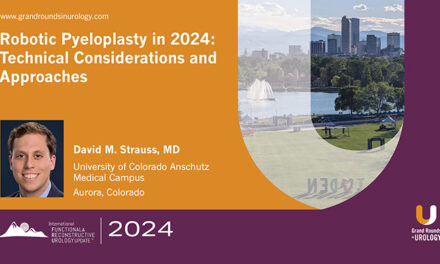Brian S. Christine, MD, presented “Treatment of Male Stress Urinary Incontinence” at the 27th Annual Innovations in Urologic Practice conference on September 22nd, 2023.
This content is available free to the GRU Community. Login or create an account to view it.
How to cite: Christine, Brian S. “Treatment of Male Stress Urinary Incontinence.” September 2023. Accessed May 2025. https://grandroundsinurology.com/treatment-of-male-stress-urinary-incontinence/
Treatment of Male Stress Urinary Incontinence – Summary
Brian S. Christine, MD, provides guidance on the assessment and treatment of stress urinary incontinence (SUI) after radical prostatectomy. Dr. Christine begins by discussing the pelvic support changes that happen in men post-prostatectomy, the relationship between the loss of pelvic support and incontinence, and the different mechanisms behind moderate and severe SUI.
Dr. Christine encourages urologists to assess each post-prostatectomy patient presenting with SUI symptoms using a thorough work-up to determine SUI mechanism and severity, an awake cystoscopy to visualize the function of the external sphincter, and a Standing Cough Test. He explains that these three steps in SUI assessment allow the attending physician to ensure that the treatment will match the severity and mechanism of the patient’s incontinence.
He then explores the process of selecting the optimal treatment between the two principal surgical options for treating male SUI: the male sling and the artificial urinary sphincter. Dr. Christine reiterates the importance of tailoring the therapy based on the information gathered during the assessment and advises urologists to visit surgeon educators on-site and develop their surgical placement skills.
Dr. Christine concludes by exploring the treatment of recurrent SUI in men who have been previously treated for SUI. He provides guidance on treating men with a prior male sling and men with a malfunctioning or affected artificial urinary sphincter.
About The 27th Annual Innovations in Urologic Practice:
Presented by co-chairs Mohit Khera, MD, MBA, MPH, and Michael Coburn, MD, FACS, the Innovations in Urologic Practice conference provides a detailed review and commentary on multiple genitourinary and urologic diseases. Among the featured oncological topics are bladder cancer and immunotherapies, as well as upper tract cancer management, prostate cancer, including state-of-the-art imaging, focal therapy, and MRI. Experts also discuss new tools and techniques for nephrectomy and treating advanced renal cell carcinoma. In terms of general urological approaches, the conference also includes pelvic reconstruction and trauma; men’s health topics like male infertility, andrology, and sexual dysfunction; OAB and voiding dysfunctions; and ways to diagnose and treat infections in the urology patient.
For further educational activities from this conference, visit our collection page.
ABOUT THE AUTHOR
Dr. Christine attended Emory University School of Medicine in Atlanta, Georgia, and then went on to complete his urology residency at the University of Alabama at Birmingham. He practiced general urology for five years, treating urologic cancers, kidney stones, female urology, and male sexual dysfunction. Over a decade ago, Dr. Christine decided to sub-specialize in prosthetic urology and men’s sexual health. At present, his internationally-recognized practice is centered on treating erectile dysfunction, Peyronie’s disease, premature ejaculation, radical prostatectomy-induced urinary incontinence, and low testosterone, as well as on providing male genital aesthetic surgery. In addition to his work as a clinician, Dr. Christine is heavily involved in the medical community and is committed to urologic education. He is Fellowship Director and Director of Prosthetic Urology and Men’s Sexual Health at Urology Centers of Alabama. He frequently hosts urologists from around the world and allows them to observe his surgeries. He is a member of the Sexual Medicine Society of North America, the International Society of Sexual Medicine, the European Association of Urology, and the International Continence Society.




